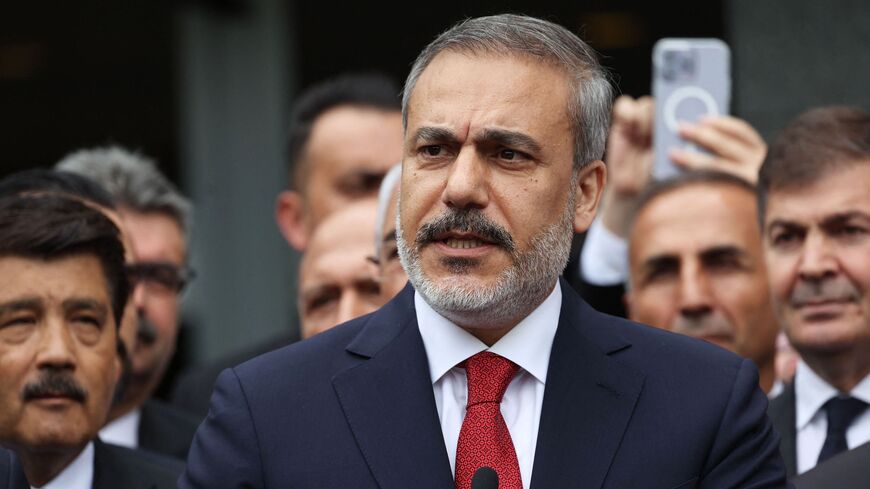ANKARA — Articulating his foreign policy vision for the first time since he took over the office, Turkey’s Foreign Minister Hakan Fidan on Monday unveiled a national security and economy-oriented foreign policy vision, pledging a stronger military and economy at home and deepening cooperation abroad. Turkey's top diplomat also asked some NATO members to end all cooperation with the outlawed Kurdistan Workers Party (PKK).
“We expect NATO to be equally considerate about each of its members’ security concerns and threats it faces,” Fidan said in a speech addressing the annual conference of ambassadors in Ankara. The conference is convening for the 14th time this week under the theme “Century of Turkey.”
“We reiterate our call on some NATO countries to immediately end their overt or covert cooperation with the PKK in Syria and Iraq," he added as the alliance awaits Turkey's parliament to ratify Sweden's membership.
In neighboring Syria, Fidan did not leave any option off the table in securing Turkey's interests. "We will make every effort to remove Syria from being a haven for terrorist organizations and an arena for proxy wars," he said.
The PKK, with offshoots present in Syria, has been waging a 40-year-old armed conflict against the Turkish state for self-rule inside Turkey.
“We will give no respite to the terrorist organizations and the forces behind them in our country and in our region,” Fidan said. “In this direction, we will continue our struggle by increasing our military, intelligence and technological capabilities at home, while ensuring effective cooperation with our friends abroad.”
After keeping a low profile as the country’s spymaster for more than a decade, Fidan stepped out of the shadows after Turkish President Recep Tayyip Erdogan appointed him as the top diplomat in June after his reelection.
Departing from traditional practice, Fidan neither flaunted Ankara's foreign policy successes as his predecessor Mevlut Cavusoglu did nor resorted to historical discourse as former Foreign Minister and now opposition leader Ahmet Davutoglu did during similar speeches at the annual conference.
Improving regional ties
Fidan's 20-minute address on Monday marked his first public and detailed articulation of his approach to his post.
“We are facing scores of simultaneous political, military, economic, environmental, technological and social challenges in the international system. … There is a need for transformation,” Fidan said, describing his foreign policy vision as turning Turkey into one of the actors that would build a new world order.
Fidan said his country would seek four strategic goals to achieve what he described as the “Century of Turkey” vision, in reference to the Turkish Republic’s centennial anniversary: “These are establishing peace and security in our region, expanding our foreign relations to an institutional basis, strengthening prosperity and advancing our global goals."
Terrorist organizations and proxy groups are the biggest threats, Fidan said.
On regional peace and security, Fidan also listed keeping stability in the Black Sea as a top foreign policy agenda, airing concern over the ongoing escalation in his country’s north between Russia and Ukraine. Military tensions between the two warring countries have dramatically escalated in the region after Russia’s withdrawal from a deal that allowed Ukrainian grain and other food products to reach world markets. Fidan discussed ways to revive the grain deal with his US counterpart, Antony Blinken, and Dmytro Kuleba over the weekend.
As for Turkey’s ongoing regional fence-mending push, Fidan expressed readiness to advance his country’s dialogue with the Syrian government, Greece and Armenia. “We will seek to solve problems, increase the number of our friends and strengthen our existing friendships,” he said.
"We intend to advance our relations with all countries in the region through a positive agenda,” he continued.
Fidan also echoed Erdogan’s push to revive Turkey’s European Union bid. Dropping his objections to ratifying Sweden’s NATO membership, Erdogan asked NATO allies to support his country’s stalled membership talks with the European bloc.
What's missing from the top diplomat’s speech, however, are democratic values that Turkey needed to adopt to revamp the process. Stopping short of a signal effort to restore his country's dismal human rights record, Fidan rather accused the EU of “strategic blindness” over the stalled talks.
The economy stood out as the second dominating theme in Fidan’s speech, with the foreign minister pledging to strengthen Turkey’s bilateral and regional economic ties on a more institutionalized basis.
After his reelection, both Erdogan and his economy team amped up their efforts to regain the confidence of international investors in a push to draw foreign funds to the country. Erdogan traveled to oil-rich Gulf monarchies in his first regional tour under his new term largely in a bid to ease his country’s acute foreign policy crunch.
“A strong, self-sufficient economy with access to global opportunities is the pillar of our national strength,” Fidan said, pledging to turn Turkey into one of the top 10 economies in the world. Yet acknowledging the challenges of his ambitious vision, he was also careful not to signal unpredictability.
“[We] will proceed with modest but steady steps,” he added.








